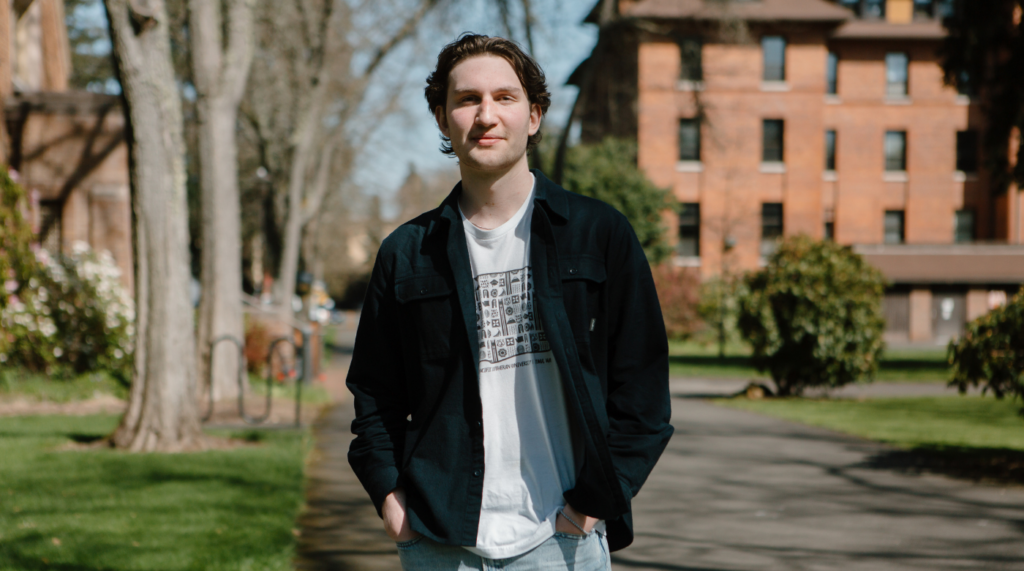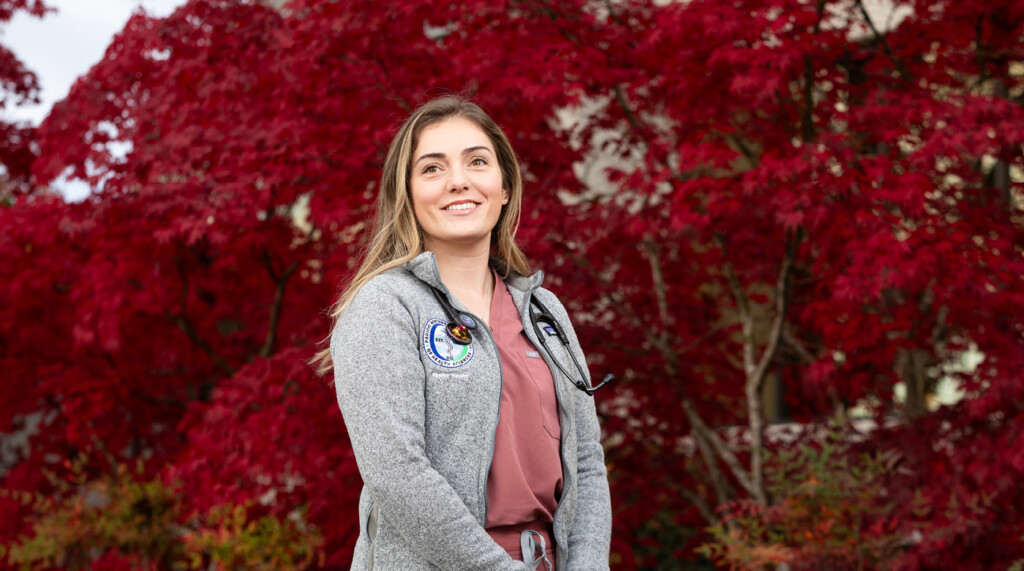Page 52 • (769 results in 0.029 seconds)
-

When PLU science students returned to campus in fall 2022 they were in for a surprise. The previously outdated anatomy and physiology lab in the Rieke Science Center had been transformed into a cutting-edge learning facility, complete with best-of-its-kind educational technology, thanks to contributions from…
.” “You can zoom in and out on different body systems,” adds Auman. “You can turn the virtual body and rotate your perspective to gain additional insights. And what appears on the table can also be projected on all the new screens around the room.” The new virtual dissection table together with other technology upgrades in the lab ensures students and faculty can also engage with teaching and learning in virtual and hybrid ways, opening up opportunities to collaborate with students, faculty and
-

Parker Brocker-Knapp ’23 grew up in Portland, but Puget Sound never seemed far—thanks to close family ties to PLU. We sat down with Brocker-Knapp to learn more about how this senior made the most of his time at PLU. How did you choose PLU? I…
, it’s been an enriching experience, and I’ve made a lot of connections with professors for mentorship, guidance and point of view. I’ll miss those, but I feel academically ready for the next step and my future. What are your plans after graduation? I plan to teach English in Spain for the next school year. After that, I’ll return to the U.S. and apply to graduate schools. To prepare, I appreciated that PLU has systems to help you with applications and a professor as a point person to help you
-

Shelby Hatton (Murdock) ’17 always knew she wanted to become a doctor, but now that she’s in osteopathic medical school she’s still deciding on what kind of doctor. The challenge, she says, is that she’s enjoying every aspect of her studies. That’s no surprise, because…
like? It’s only a one-year program. In the beginning of the year you take the same Sci-FOM course – scientific foundations of medicine – as the DO students. You’re in that same class, and that’s just to cover all of the basic biomedical science information to make sure that all of the students are on the same page in terms of the basic science. Then, in November, when the DO students transition to systems courses, the MAMS students take a set of other courses. This includes classes like biomedical
-

Angie Hambrick still identifies as a Midwest girl, but after working at PLU for 18 years, she’s also a Lute through and through. As the associate vice president for diversity, justice and sustainability, Hambrick provides strategic vision on matters related to equity and inclusion and…
. It’s no surprise that these groups retain at a lower rate than their peers. Universities were intentionally designed to keep these folks out. Now we’ve let them in, but that alone isn’t nearly enough. Institutions need to rethink, and in a lot of cases completely reconstruct, our systems and structures to equitably serve all of the students we’re recruiting.What do you mean by doing harm?When students come here and leave with debt and without degrees, that’s harmful and unethical. That’s why I
-
The pre-professional program at PLU is a course of study (not a major) that prepares you for admission into a professional school or training program following your undergraduate study.
laboratory A research grade scanning electron microscope A tissue processing microtechnique room A microscopy room Containment facilities for recombinant DNA experiments A human cadaver morgue FTIR, GC/MS, UV/VIS, 500 MHz FTNMR, and emission spectrometers gas and liquid chromatographs PC data acquisition systems Pulsed molecular nitrogen laser Dye laser workbench Pre-med at PLUWhile studying at PLU to prepare for medical school you will: Successfully complete all of the courses required for admission to
-
The pre-professional program at PLU is a course of study (not a major) that prepares you for admission into a professional school or training program following your undergraduate study.
laboratory A research grade scanning electron microscope A tissue processing microtechnique room A microscopy room Containment facilities for recombinant DNA experiments A human cadaver morgue FTIR, GC/MS, UV/VIS, 500 MHz FTNMR, and emission spectrometers gas and liquid chromatographs PC data acquisition systems Pulsed molecular nitrogen laser Dye laser workbench Pre-med at PLUWhile studying at PLU to prepare for medical school you will: Successfully complete all of the courses required for admission to
-
A yearlong sabbatical in 2017-18 provided Dr. Brenda Llewellyn Ihssen, Dr. Michael Schleeter, and Dr. Seth Dowland with opportunities to rethink their courses and pursue scholarly interests.
additional strategies for meeting these goals. Dr. Michael Schleeter, Associate Professor of Philosophy, teaches and produces scholarship in the areas of ethics and political philosophy. During his sabbatical, he was able to take time to rest and restore as well as explore new topics that further extended his areas of expertise, including the role of biology and evolution in systems of ethics.Dr. Schleeter stated that this branch of philosophy includes humanity’s development of moral capacity over time
-
Dr. Erik Hammerstrom, Seminar in Religion
because it gave me many new perspectives on the world. How people interact with each other, nature, social structures, etc, can all be traced to religious history. Being able to understand this has provided me the knowledge and empathy to interact with people of many different backgrounds and belief systems, which is a valuable insight I am very grateful for. Final Video Presentation “But...How Should Our Women Pray?” An Interpretation of Paul’s Conflicting Comments to the Corinthians (1 Cor 11:2-16
-
Speaker: Tamara R. Williams, Professor of Hispanic Studies Executive Director, Wang Center for Global and Community Engaged Education Location: Zoom
the connection between trauma and substance use and provide guidance for clinicians on applying intervention strategies for youth impacted by trauma and substance use based on a manualized treatment approach designed specifically to address these problems. Trauma Systems Therapy for Adolescent Substance Abuse (TST-SA, Suarez, Ellis, & Saxe, 2013) is an integrated treatment program that incorporates empirically validated intervention strategies targeting both substance abuse and traumatic stress in
-
The DJS Fee is a $10 fee per semester per student that helps support diversity, justice, and sustainability initiatives on campus.
students, undocumented students, first in family students, and students who receive accommodations (Center for DJS, Campus Life, Wellness & Health Services) DJS Student Fellowships + Research: Supporting student research furthering PLU’s DJS practices. (Center for DJS) DJS Tracking and Assessment: Tools and systems to provide feedback and accountability for DJS initiatives. (AVP for DJS) Cultural Celebrations: Funding events that celebrate and uplift various world cultures backgrounds. (Center for DJS
Do you have any feedback for us? If so, feel free to use our Feedback Form.


